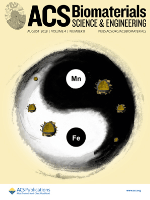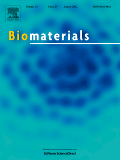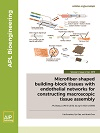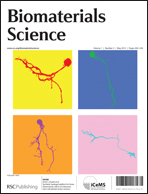
Materials
Scope & Guideline
Advancing knowledge in materials science and condensed matter physics.
Introduction
Aims and Scopes
- Nanomedicine and Drug Delivery Systems:
The journal extensively covers research on nanoparticles, liposomes, and other nanostructured systems designed for targeted delivery of therapeutics, enhancing the efficacy and reducing the side effects of treatments. - Tissue Engineering and Regenerative Medicine:
Research articles frequently explore the development of scaffolds, hydrogels, and other biomaterials aimed at regenerating damaged tissues and organs, with a focus on enhancing cell proliferation and differentiation. - Biocompatibility and Bioactivity of Materials:
A significant focus is placed on the interactions between materials and biological systems, emphasizing the importance of biocompatibility, the immune response, and the modulation of cellular behaviors to improve therapeutic outcomes. - Smart and Responsive Materials:
The journal features studies on materials that respond to environmental stimuli (e.g., pH, temperature, light) for controlled drug release, enhanced imaging, and other applications in biomedicine. - Photothermal and Photodynamic Therapies:
Innovative materials for photothermal and photodynamic therapies are a prominent theme, with research aimed at utilizing light-activated systems for cancer treatment and other therapeutic applications. - Microphysiological Models and Organ-on-a-Chip Technologies:
The journal publishes research on the development of microfluidic systems and organ-on-a-chip models to study disease mechanisms and drug responses in a physiologically relevant context.
Trending and Emerging
- Targeted and Personalized Medicine:
There is a notable increase in research focused on developing targeted therapies and personalized medicine approaches, utilizing materials that can specifically interact with patient-specific biomarkers or tumor microenvironments. - Immunotherapy and Immunomodulation:
Emerging studies are increasingly exploring the intersection of materials science and immunotherapy, focusing on materials that can modulate the immune response to enhance therapeutic efficacy against cancers and other diseases. - Smart Biomaterials and Bioelectronics:
Research on smart biomaterials that incorporate electronic properties for real-time monitoring, drug delivery, and tissue engineering is on the rise, reflecting advances in bioelectronics and their applications in healthcare. - Sustainable and Green Materials:
There is a growing emphasis on the development of sustainable materials derived from natural sources or designed to be biodegradable, aligning with global trends towards environmental sustainability in biomedical applications. - In Vivo Imaging and Diagnostic Technologies:
Studies focusing on materials that enhance imaging capabilities for diagnostics, particularly using advanced imaging techniques such as NIR-II fluorescence and photoacoustic imaging, are trending, indicating a shift towards integrating materials with diagnostic technologies.
Declining or Waning
- Traditional Biomaterials without Functionalization:
Research focused solely on traditional biomaterials, such as inert polymers, without exploring their functionalization or integration with biological systems appears to be declining. There is a growing trend towards more sophisticated, bioactive, and responsive materials. - Conventional Drug Delivery Methods:
Papers on conventional drug delivery methods that do not incorporate nanotechnology or advanced materials are becoming less frequent, as the field shifts towards more innovative, targeted, and controlled release systems. - Non-Engineered Natural Biomaterials:
The use of unmodified natural biomaterials without any engineering or enhancement is seeing a decrease, as researchers increasingly prioritize the customization and optimization of materials for specific biomedical applications. - Basic Mechanical Properties Studies:
Studies focusing solely on the mechanical properties of materials without linking them to specific biomedical applications or outcomes are less common, as the emphasis shifts towards functional performance in biological contexts.
Similar Journals

MACROMOLECULAR BIOSCIENCE
Driving Discovery in Polymers and BiotechnologyMACROMOLECULAR BIOSCIENCE, published by WILEY-V C H VERLAG GMBH, is a leading journal in the fields of bioengineering, biomaterials, biotechnology, materials chemistry, and polymers and plastics. With a convergence of scientific inquiry since its inception in 2001, the journal has established itself as a vital resource for researchers and professionals exploring the interface of molecular sciences and biosystems. It boasts impressive Scopus rankings, including Q1 status in multiple categories, reflecting its significant contribution to advancing knowledge and innovation in the polymer and biomaterials domains. While the journal does not currently offer open access options, its rigorous peer-review process ensures the publication of high-quality research that fuels academic discourse. Positioned in Weinheim, Germany, MACROMOLECULAR BIOSCIENCE aims to bridge theoretical understanding with practical applications, making it an essential reference for students, academics, and industry practitioners dedicated to the evolving landscape of macromolecular bioscience.

Cellular and Molecular Bioengineering
Pioneering Interdisciplinary Approaches in BioengineeringCellular and Molecular Bioengineering, published by SPRINGER, is a prominent journal dedicated to the exploration of interdisciplinary approaches in the fields of biochemistry, genetics, and molecular biology. With an ISSN of 1865-5025 and an E-ISSN of 1865-5033, this journal has been a pivotal resource since its inception in 2009, showcasing groundbreaking research that combines innovative modeling and simulation techniques with cellular and molecular applications. As a Q2 journal in both Biochemistry, Genetics and Molecular Biology (miscellaneous) and Modeling and Simulation categories, it ranks favorably in the Scopus metrics, placing 62nd out of 324 in Mathematics_ Modeling and Simulation, and 69th out of 221 in General Biochemistry, Genetics and Molecular Biology. The journal's commitment to quality research and its contribution to advancing academic dialogue make it essential for researchers, professionals, and students seeking to stay at the forefront of bioengineering innovation. While it currently does not offer open access, it continues to provide significant insights and empirical studies that can help shape future developments in the field, reinforcing its role as a key player in cellular and molecular bioengineering.

ACS Biomaterials Science & Engineering
Exploring the Boundaries of Biomaterials ResearchACS Biomaterials Science & Engineering, published by the American Chemical Society, serves as a premier platform for the latest advancements and research in the fields of biomaterials and biomedical engineering. With an impressive impact factor and a strong reputation reflected in its ranking—Q2 in Biomaterials and Q1 in Biomedical Engineering—the journal attracts a diverse and engaged readership. Since its inception in 2015, it has aimed to foster innovation by publishing high-quality research articles, reviews, and perspectives on the synthesis, characterization, and application of biomaterials. Researchers and professionals benefit from the journal's rigorous peer-review process and its focus on translational science, making it essential for those looking to stay at the forefront of biomaterials research. Located in Washington, DC, USA, the journal plays a pivotal role in connecting academic and industrial sectors, ultimately driving advancements that impact biomedicine and related fields.

Journal of Materials Chemistry B
Connecting Disciplines Through Materials Chemistry Discoveries.Journal of Materials Chemistry B is a prestigious peer-reviewed journal published by the Royal Society of Chemistry, specializing in the latest advancements in the realm of materials chemistry. With a profound impact in the scientific community, this journal has achieved impressive Q1 quartile rankings in 2023 across several categories, including Biomedical Engineering, Miscellaneous Chemistry, Materials Science, and Medicine, illustrating its pivotal role in interdisciplinary research. Its impressive Scopus rankings further emphasize its widespread recognition, with notable placements in the top percentiles for various fields. Covering a broad scope of topics from novel materials for biomedical applications to innovative chemical synthesis techniques, the journal aims to promote knowledge exchange and foster collaborative research across disciplines. Although not an open-access journal, it offers a platform for researchers to share their findings and contribute to the evolving discourse within materials science. With a publication record spanning from 2013 to 2024, the Journal of Materials Chemistry B remains an essential resource for researchers, professionals, and students dedicated to exploring the frontiers of materials chemistry.

BIOMATERIALS
Harnessing Science for Innovative Biomaterials ApplicationsBIOMATERIALS, published by Elsevier Science Ltd, is a premier academic journal dedicated to the interdisciplinary field of biomaterials research. With an impressive impact factor, it ranks in the Q1 quartile across multiple categories including Bioengineering, Biomaterials, and Biophysics, showcasing its significance in advancing scientific knowledge. Established in 1980 and set to converge its discussions through 2025, this journal provides a critical platform for researchers and professionals to disseminate their findings on the development, application, and performance of biomaterials. The journal covers a wide range of topics, from the mechanics of materials to nanotechnology, and is highly regarded with top Scopus rankings in essential categories, including an exceptional position within the 99th percentile for Biophysics. Although not an open access journal, BIOMATERIALS remains vital for students and established researchers alike, ensuring accessibility to groundbreaking research in the field. Engage with cutting-edge studies that pave the way for innovative applications in medicine, engineering, and beyond.

Biofabrication
Pioneering New Frontiers in Biochemistry and Engineering.Biofabrication, published by IOP Publishing Ltd, stands at the forefront of the interdisciplinary fields of biochemistry, bioengineering, biomaterials, biomedical engineering, biotechnology, and miscellaneous medicine. Since its inception in 2009, this prestigious journal has secured its position within the Q1 category across multiple disciplines as of 2023, reflecting its high impact and significant contribution to advancing research in these domains. With ranks such as #19 in biochemistry and #10 in biomaterials according to Scopus, it showcases groundbreaking studies and innovative methodologies that are crucial for the evolution of biofabrication technologies. Authored by leading researchers and professionals, the journal publishes articles that explore the synthesis, characterization, and application of biomaterials, providing valuable insights for both academic researchers and industry practitioners. The impact factor of the journal, combined with its rigorous peer-review process, guarantees high-quality content that pushes the boundaries of knowledge and technology. Researchers and students engaged in these dynamic fields will find Biofabrication an indispensable resource for staying abreast of critical developments and emerging trends.

Advanced Therapeutics
Pioneering interdisciplinary research for tomorrow's health.Advanced Therapeutics, published by WILEY in the United Kingdom, stands at the forefront of medical and pharmaceutical research, offering invaluable insights from 2018 to 2024. This distinguished journal, with an E-ISSN of 2366-3987, is recognized for its exceptional academic rigor, boasting an impressive array of Q1 categorizations in essential fields such as Biochemistry (medical), Pharmaceutical Science, and Pharmacology. With its strategic focus on interdisciplinary studies and cutting-edge therapeutic developments, Advanced Therapeutics serves as a vital resource for researchers, professionals, and students keen on advancing their knowledge and contributing to the evolving landscape of medicine and genetics. The journal's high Scopus rankings further affirm its impact, with significant placements in multiple categories underscoring the quality of published research. Although the journal operates under a subscription model, its accessibility to high-impact findings ensures that it remains a pivotal platform for innovative discourse in therapeutics.

APL Bioengineering
Innovating at the Intersection of Science and MedicineAPL Bioengineering is a premier open-access journal published by AIP Publishing, dedicated to advancing the field of bioengineering and its interdisciplinary applications. Established in 2017, this journal serves as a vital platform for researchers, professionals, and students interested in the critical intersections of bioengineering, biomaterials, biomedical engineering, and biophysics. With an impressive impact factor and consistent rankings in the Q1 category across multiple domains, including biochemistry and materials science, APL Bioengineering has positioned itself among the top journals in its field. The journal aims to publish innovative original research, comprehensive reviews, and insightful case studies that further the understanding and application of bioengineering principles. Since its inception, APL Bioengineering has fostered a community of thought leaders, providing open access to ensure broad dissemination of knowledge and advancements that underpin the future of biomedical innovation.

CELLS TISSUES ORGANS
Pioneering Research in Biological Structures and Functions.CELLS TISSUES ORGANS is a renowned academic journal published by KARGER, focusing on pivotal research within the fields of Anatomy and Histology. Based in Switzerland, this journal has been disseminating influential scientific findings since 1889, contributing to our understanding of cellular structures and tissue functionality. With a current impact factor that places it in the Q2 quartile for both disciplines, it serves as a vital resource for researchers, professionals, and students seeking to stay abreast of significant advancements and discussions in these areas. The journal embraces an Open Access model, ensuring that high-quality, peer-reviewed articles are freely available, thus enhancing visibility and accessibility of critical research. As it continues to foster scholarly communication and innovation up to 2024, CELLS TISSUES ORGANS plays a crucial role in shaping the future of biological sciences and medical research.

Biomaterials Science
Pioneering advancements in biomaterials for a healthier world.Biomaterials Science is a premier journal published by the Royal Society of Chemistry that serves as a leading platform for researchers and professionals in the fields of Biomedical Engineering and Materials Science. With an impressive impact factor bolstered by its Q1 quartile ranking in both disciplines, this journal has positioned itself at the forefront of cutting-edge research, showcasing innovative materials and applications that drive advancements in healthcare and technology. Since its inception in 2013, Biomaterials Science has been committed to disseminating high-quality, peer-reviewed articles that promote scientific knowledge and collaboration among academia and industry. With a global readership and a focus on open access, researchers are encouraged to share their findings to facilitate the development of transformative biomaterials and their applications. Join a vibrant community of scholars as we explore the future of biomaterials through this esteemed publication, enhancing both scientific inquiry and practical application.